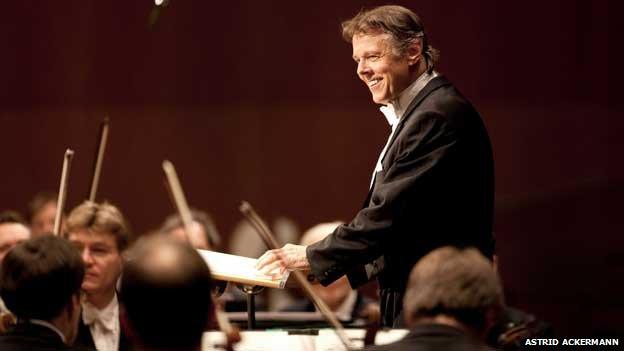The etiquette of clapping at classical concerts
- Published

There was a tense moment in the otherwise sublime performance of Tchaikovsky's Symphony Number 6 in B Minor, "Pathetique" at the Usher Hall, as part of the Edinburgh International Festival at the weekend.
As the Bavarian Radio Symphony Orchestra - under conductor Mariss Jansons - brought the third movement to its thundering conclusion, there was the briefest of pauses, a shout of "bravo" and then a tumultuous round of applause.
Only it wasn't over.
Those who had not read their programme notes, shuffled in their seats. Those, who had deliberately defied convention and knowingly clapped between movements brazened it out.
But what is the etiquette for clapping during movements at classical concerts?
If it is acceptable to applaud an aria in an opera, why not the efforts of a whole orchestra?
Susan Nickalls, music critic of The Scotsman, says there is a balance to be struck.
"I get more upset when people cough and hack their way through a concert. Clapping certainly isn't a crime but it does depend on the circumstances," she says.
"I think it's nice for people to be free enough to express themselves in the moment but the thing I do hate is when it's a really quiet piece and you are transported somewhere else entirely and when the piece ends you just want to stay there until the very last beat echoes, or the last string pulses, and there's always someone somewhere who just needs to be the first to clap. And that interrupts that moment."
Spontaneous applause
Which might explain the tense look on the conductor's face as he continued with the piece. But surely, in a bid to encourage less stuffiness and more spontaneity, not to mention a younger audience, such outbreaks of applause should be appreciated?
Carol Main agrees. As director of Live Music Now Scotland, she is frequently charged with taking music to new audiences who often burst into spontaneous applause.
"We encourage that, and to be honest, I think that piece was played in a way which encouraged applause too," she says.
"I didn't mind it, and I don't think the orchestra did either.
"It's a question of being considerate. If you lost the continuity, or distracted the orchestra, it would be different.
"The opposite is what you saw at the end of Gotterdammerung at the Proms, when the audience was so lost in the moment, they stayed silent for maybe 10 or 15 seconds after the piece finished. Just as effective as a round of applause."
She also points out that different countries follow different concert etiquette.
British audiences at classical concerts applaud - but rarely stand to do so. In Italy, the standing ovation at a concert is perfectly normal.
So with a whole string of concerts by international orchestras lined up between now and the end of August, the niceties of concert etiquette are only just beginning.